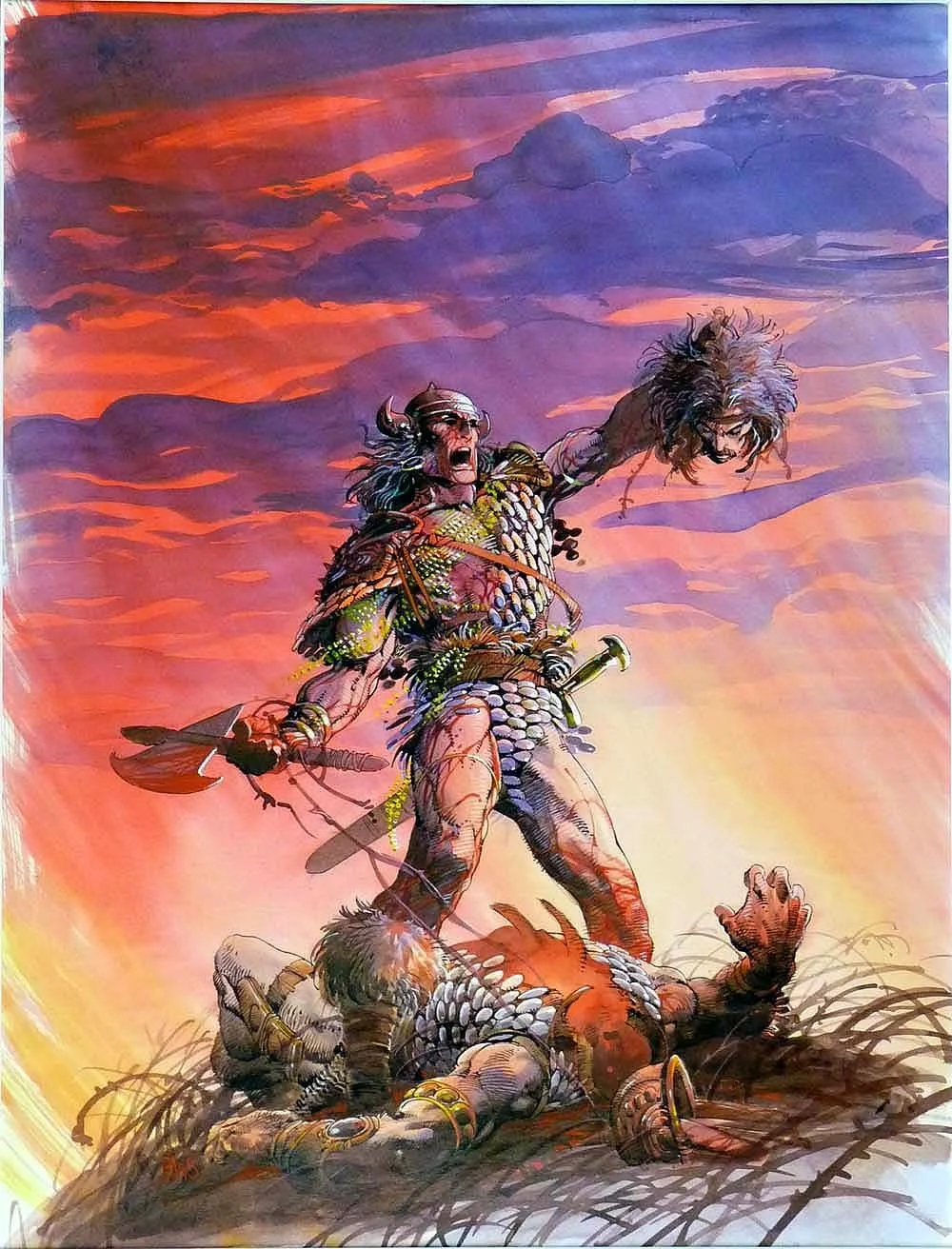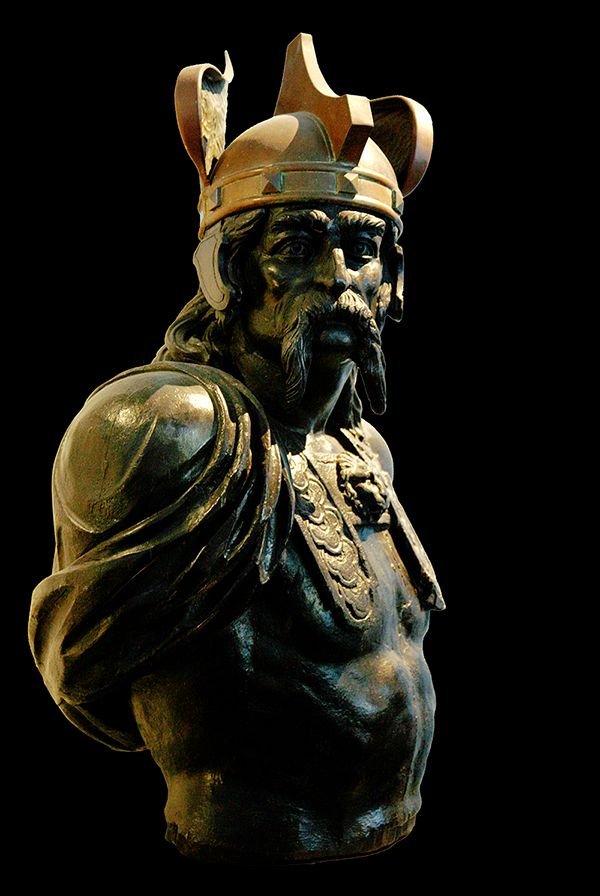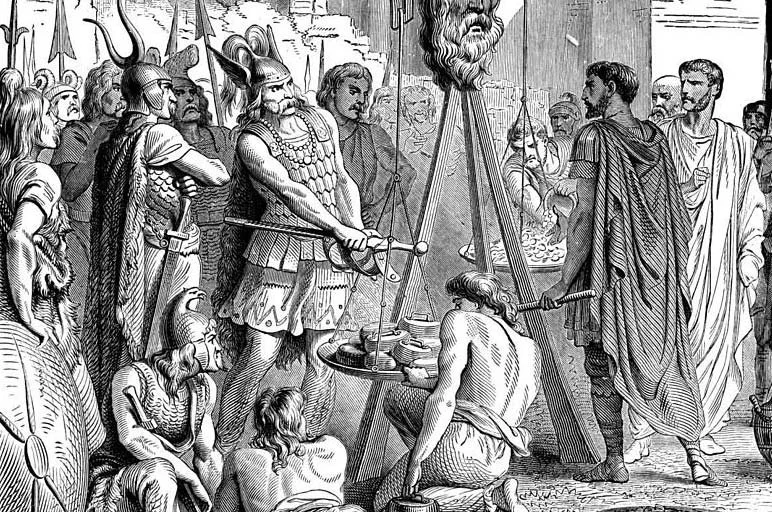Brennus: The Nemesis of Rome
"My name has been Hialmar, Tyr, Bragi, Bran, Horsa, Eric and John. I strode red-handed through the deserted streets of Rome behind the yellow-maned Brennus..." -- "The Valley of the Worm", February 1934
When I wrote my introduction for DMR Books’ Celtic Adventures, I had to walk a tightrope. Sure, there has been an upsurge in ‘Celtic Fantasy’ these past forty years or so, but most of that has been hijacked by the ‘Strong-(mystical)-woman-who-don’t-need-no-man/Eco-warrior/Noble Savage’ contingent. The actual Celts certainly appreciated Nature. Celtic poetry from Ireland and Wales forms some of the first (and best) ‘Nature Poetry’ in all of world literature. Celtic women also enjoyed freedoms not seen in many societies of the time.
All of that being true, the hard, bloody facts are that the Celts were--as were the rest of their ancient Yamnaya/Indo-European brethren--patriarchal warriors mad for glory. I titled my intro to Celtic Adventures, "Born Fighting", because that is what Celts have always been. Whether born in Galatia or Connacht--or Texas—a Celtic male was simply expected to wreak bloody mayhem upon his people's enemies. It was a cultural given. That warrior spirit spread Celtic culture from Ireland to Turkey and from Spain to Poland. These weren't just workaday warriors; they brought home heads to their tribes-folk and were glorified for it. Head-takers and widow-makers.
Art by Barry Windsor-Smith.
The 'tightrope' I walked was trying to get across to readers this deep history of sheer bloody-mindedness and mayhem without bogging down in historical examples. So, I did a broad skim of Celtic martial history and then commented on the tales within Celtic Adventures. One of the historical tales I left out is that of Brennus, the first man to sack Rome. Hannibal didn't do that. Spartacus didn't do that. Brennus did. Ponder that.
The classic bust of Brennus, king of the Senones and sacker of Rome.
Robert E. Howard was quite a fan of that Brennus--there was another notable Brennus a century later. Here are Howard's (slightly) edited comments:
"I named him [Bran Mak Morn] Bran, for another favorite historical character of mine — the Gaul Brennus, who sacked Rome." -- Robert E. Howard to H.P. Lovecraft, 1932
"I regard the Roman hero Camillus with the respect one must give a bold and resourceful foe. I favor Brennus, of course, but must admit he was not the Roman’s equal in strategy and tactics. By the way, aside from instinctive feelings and tribal placements, I wonder how the world’s history would have been written had the Gauls pushed on after their defeat of the Romans at Allia, and destroyed completely the budding Roman civilization? -- Robert E. Howard to H.P. Lovecraft, March 2, 1932*
Robert E. Howard was one of the great Celtophile authors of the early twentieth century. His praise of and admiration for Brennus, king of the Senones, is in no way surprising. Not only did REH identify with the Celts in general, he viscerally hated the Romans. Brennus made the Romans eat dirt and run like cattle on that fateful day in 387 BC.
The Senones were far-ranginging conquerors. Originating in central Gaul, they crossed the snow-clad Alps as early as the seventh-century B.C. into what is now Italy. Slaughtering and pillaging as they went, the Senones--whose tribal name seems to mean something like 'The Old Guard/Breed/Original Gangstas'--finally set down roots not far from what was then the Republic of Rome, naming their city 'Senigallia', which, by the reckoning of some sources, was the ‘capital’ of Cisalpine Gaul. In just a few generations, they had crossed Gaul, traversed the Alps and settled in central Italy—nearly a thousand miles of migration.
Who was this 'Brennus'? The traditional view is that the name is derived from Celtic 'bran'--'raven'. However, it seems a bit coincidental that another Celtic warlord had the exact same name a century later. The alternate theory is that 'Brennus' is a title, a version of 'chieftain/king', as seen in the Breton 'Bryan' and the Irish Gaelic 'Brian/Brionn'. Whatever the case, Brennus of the Senones met the moment and laid the smack-down on the Roman army sent against him.
Brennus, surrounded by his captains, surveying the Roman forces.
The details and provocations leading up to the Battle of the Allia River are essentially irrelevant. The official accounts of 'why' it occurred are contested and contradictory. The outcome is not. I'll quote The Roman Empire website for a few paragraphs:
"The military tactics employed by the Romans during the Battle of Allia were traditional legion formations, which typically emphasized flexibility and the ability to respond to various battlefield situations. However, on this occasion, these tactics proved insufficient against the innovative strategies of their adversaries. The Roman military, reputed for its disciplined fighting units, encountered a force that challenged their conventional approach to warfare.
The Gauls were led by Brennus. The Romans, expecting a more traditional engagement, were taken by surprise when the Gauls launched a sudden and ferocious attack. Positioned with their flanks exposed near the Allia River, approximately 11 miles north of Rome, the Roman forces were quickly overwhelmed by the more aggressive and mobile Gallic warriors. Panic spread through the Roman ranks, causing a disorganized and chaotic retreat. Some soldiers fled to the nearby city of Veii, while others made their way back to Rome. The disarray and lack of a coherent defense strategy left the Roman army unable to regroup or counterattack, resulting in a decisive and devastating defeat.
The defeat at Allia was one of the most disastrous for the Roman Republic. Not only were the military tactics bested, but also the Roman legions suffered substantial casualties. The battle’s result sent shockwaves through Rome, as the defeat laid bare the vulnerability of a Republic often perceived as militarily invincible. The loss at the Allia River, along with the number of fatalities and captives taken, marked a dark day in Roman history, underscoring the devastating potential of underestimating one’s adversary.”
Blood-mad Gauls versus Romans. Art by Wayne Reynolds.
“After the defeat at the Battle of Allia, the Gallic tribe breached Rome’s defenses and proceeded to sack the city. Rome faced a dire emergency, with most of its quarters plundered and burnt, except for the Capitoline Hill, which held out under siege. According to historical accounts, the Romans were forced to pay a large ransom of gold to convince the Gauls to leave, symbolizing a humiliating capitulation.
The shocking defeat brought to light the inadequacies of Rome’s military tactics and organization. In response, significant military reforms were instituted, which historians consider a turning point in Roman History. Notably, Marcus Furius Camillus, appointed dictator following the disaster, played a central role in these reforms, which included the restructuring of the army and the adoption of more flexible tactics to replace the rigid phalanx formation previously used."
TL:DR... The Senonean Gauls, blood-mad and lead by the mighty Brennus, swarmed the Roman phalanxes and shattered them. The Romans were neither incompetent nor decadent--at that point. Despite that, they were overwhelmed by the agility, mobility, hostility and virility of the Celtic warriors they faced. The Gallic cavalry--some of the best in the world at that point--rode down the terrified Romans, their bloody lances and longswords reaping a deathly harvest.
Brennus then led his Gauls on a looting spree of Rome which would not be equaled for almost a thousand years. As I said: head-takers, widow-makers and heart-breakers.
However, the citadel in the center of Rome remained in Roman hands. After a surreptitious Senonean attack was thwarted, Brennus and his Gauls agreed to negotiate—subsequent events being glossed over by the (understandably) Romanophilic Roman History website. Here is what a more neutral website has to say:
‘A conference is held between the leaders of both parties, the tribune Quintus Sulpicius and Brennus, chieftain of the Senones. They agree upon a payment of “a thousand pounds of gold,” which Livy derides as “a foul disgrace,” for the Romans are a people “destined presently to rule the nations.” The Gauls add further insult to this “disgrace” by using what Livy insists are dishonest scales to weigh the Roman tribute. When Sulpicius complains, Brennus utters one of the most iconic lines in all of Roman history:
The insolent Gaul added his sword to the weight, and a saying intolerable to Roman ears was heard, —Woe to the conquered!’
“Eat it!”—a free translation from the Gaulish.
That, DMR Books readers—as noted—is one of the most memorable phrases uttered in the West during the last twenty-five hundred years. “Vae victis!”—”Woe to the conquered!”—in Classical Latin. It has also been translated as, “To the victors go the spoils!”.
It is quite possible Brennus stated that phrase in Latin. Celtic and Latin are cousin tongues and Senigallia lay within marching distance of Rome.
However he said it, Brennus carved his name into the bedrock of Western Civilization. He also sealed the fate of most of the Celtic nations of Europe.
‘Nuff said!
As the Roman Empire article states above, Marcus Furius Camillus reformed the Roman military system. The Romans--always keen to adopt the best military doctrines--had copied the Greek phalanx quite faithfully a century before. That relatively static formation proved inadequate when attacked by free-wheeling, blood-mad Celtic warriors on the gory banks of the Allia.
Robert O'Connell, in his magisterial work of military history, Of Arms and Men, noted that the Romans vowed to 'Never Forget' the humiliation suffered at the Battle of the Allia. They completely reimagined their army, eventually creating the most consistently lethal (pre-gunpowder) heavy infantry in human history…borrowing much of their hardware from the Celts. A "human buzz-saw", as O’Connell called it.
Brennus and his Gauls were the catalyst for that revolution. The Greeks and Macedonians ignored that savage battle fought on the banks of an obscure Italian river. A century later, they would face the same Celtic battle-fury and live to regret it…but that is a tale of another Brennus.
*My thanks to John Bullard for providing a couple of quotes.







